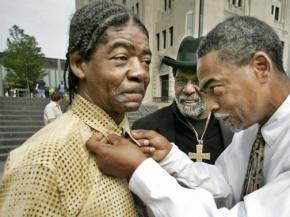Adding insult to injustice
The injustice system has again victimized Anthony Porter, writes .
A CHICAGO man who 10 years ago came within days of being murdered by the Illinois execution machine before he was proven innocent is going back to jail--for taking sticks of deodorant from a South Side drugstore.
Anthony Porter was arrested at a Walgreens drugstore just blocks from his house last fall. He pled guilty to retail theft and was given a prison sentence of one year--even though the value of what he took amounted to a few dollars.
Such a sentence would be a cruel injustice no matter who got it, but it's especially grotesque happening to Porter.
In 1999, after spending 17 years behind bars for a crime he didn't commit, Porter became the 10th person released from Illinois' death row in about as many years. With the state's execution system coming under growing scrutiny, his case came to stand for everything that was wrong with capital punishment in Illinois.
Now, his post-death row life is showing what's wrong with the broader criminal justice system under the New Jim Crow.
PORTER WAS accused of a 1982 double murder, based on the testimony of a witness who at first told police he hadn't seen the crime take place. Porter maintained his innocence, and there was no physical evidence against him. But Porter's lawyer didn't meet him until just before the trial and fell asleep during the proceedings. A jury found Porter guilty, and he was sentenced to death.

In 1998, Porter won a stay of execution with less than 50 hours before he was scheduled to die. At this point, the justice system was still convinced of his guilt--more than 30 judges at all levels had signed off on the "evidence" that Porter committed the murders. The execution was only stopped for a "fitness" hearing--after lawyers and activists, including Chicago's Campaign to End the Death Penalty, held a press conference questioning Porter's mental competence and the injustice of executing someone with a possible disability.
Shortly after the stay was granted, a team of investigators and journalism students obtained the confession of another man for the crime Porter was accused of, leading to Porter's release. They also uncovered police misconduct--the key witness in the case recanting his testimony, saying that he only accused Porter after being coerced by police. It also turned out that one of the jurors was connected to one of the victims and even attended the funeral, but the judge refused to declare a mistrial.
The injustice of Porter's case sparked public outrage and the push for a moratorium on executions in Illinois. The Chicago Tribune ran a series of articles on the dire flaws with the system. Activists organized public forums, rallies and marches to push for a halt on executions.
When then-Gov. George Ryan yielded to the pressure and declared the moratorium in 2000, he cited Porter's case. In his announcement, Ryan said, "How do you prevent another Anthony Porter--another innocent man or woman from paying the ultimate penalty for a crime he or she did not commit?" In 2003, Ryan cleared death row with a mass commutation. In 2011, capital punishment was officially abolished in Illinois.
Despite the public outcry about his case, Porter was never compensated for his time on death row, outside of approximately $145,000 awarded a year after his release. This amounts to less than $10,000 for each year stolen from Porter.
Like other released prisoners, Porter received no support in his transition to life outside prison walls. In 2005, Porter's civil lawsuit of $24 million against the City of Chicago for false imprisonment was rejected. The jury of his "peers" was all-white--in a city that is only 33 percent white and 36 percent African American.
Porter will spend one year in prison for theft amounting to a few dollars. Meanwhile, the police who coerced witnesses and the prosecutors who falsely accused Porter and nearly killed him were never even found liable for financial damages, much less charged with a crime.
Another terrible injustice has been heaped upon a man who was nearly murdered by the American injustice system.


